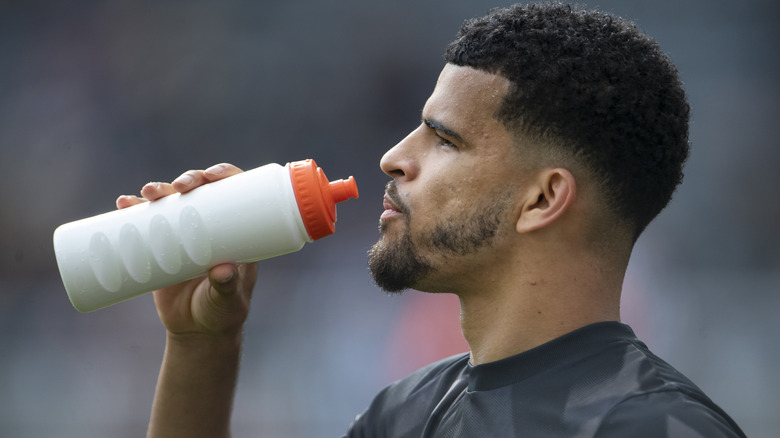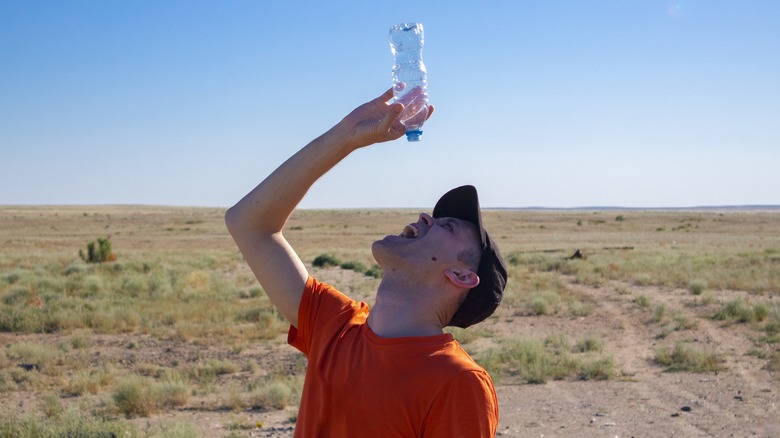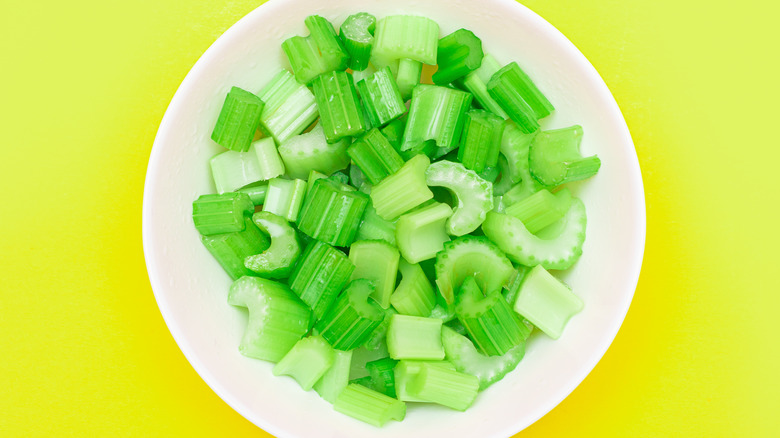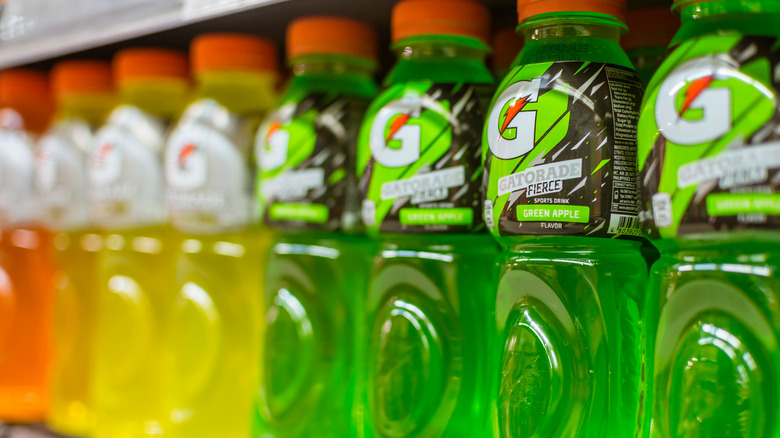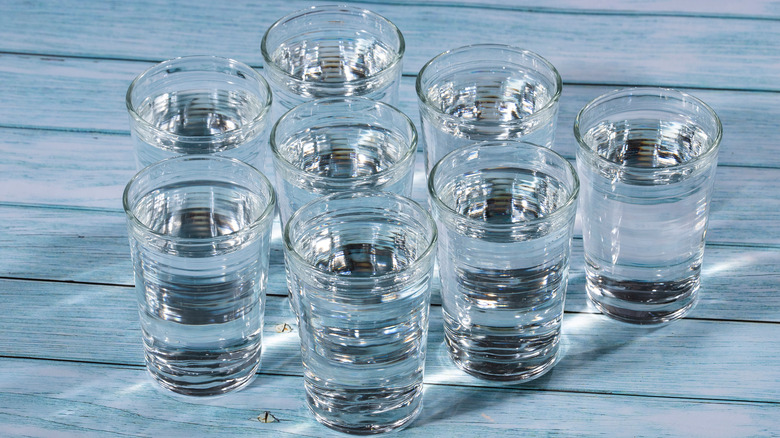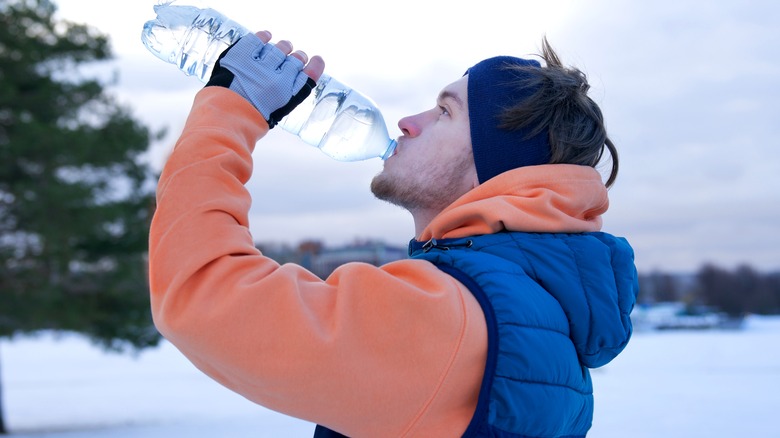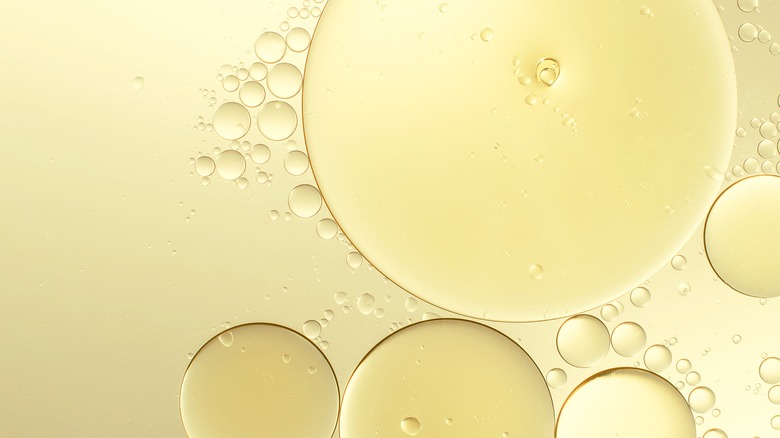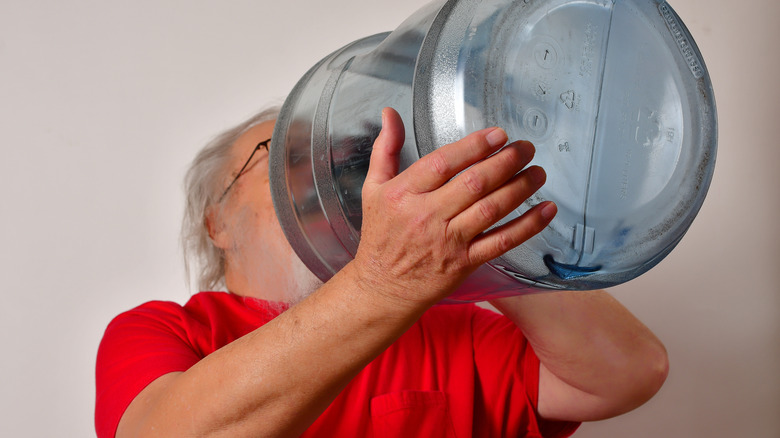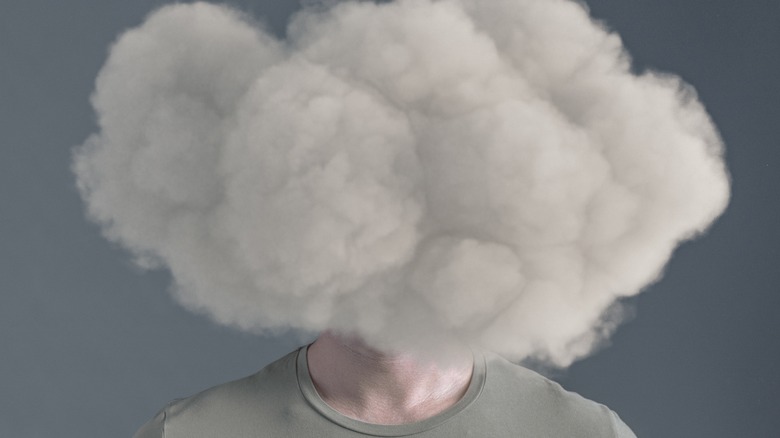Myths You Should Stop Believing About Hydration
Staying hydrated is one of the most important things you can do for your body. But what is hydration, exactly? Essentially, being hydrated is the act of getting enough water. Several bodily processes can strip away the water your body holds, like sweating, urinating, and exhaling, making it necessary for you to replace that water (per Texas Health and Human Services). Water is necessary for optimal health, as it can improve your breathing, help the body carry out waste, and move nutrients to your cells, just to name a few of its most important tasks.
When your body loses more water than it takes in, dehydration can occur. The primary purpose of hydrating properly is to prevent dehydration from happening. But hydration can also help you lose weight, boost your mood, and improve your sleep quality (via CNN). However, you should know the ins and outs of hydrating properly to make sure you're getting it done efficiently and effectively. Continue reading to learn about common hydration myths you'll want to avoid.
Myth: Feeling thirsty always means you're dehydrated
Something you might hear often regarding feeling thirsty is that if you're thirsty, you're already dehydrated. Doctor Scott Youngquist tells University of Utah Health that there is certainly truth to thirst indicating that you need water. However, it doesn't always mean that your body is knocking on the door of dehydration. Rather, feeling thirsty can mean that you're beginning to dehydrate, but usually mildly. Listening to your body and getting some water when you feel thirsty can prevent dehydration from worsening.
Thirst can also be a sign of problems other than dehydration, and it's important to pay attention to excessive thirst or constant thirst. According to WebMD, being thirsty most of the time can also signal health problems like anemia or diabetes. Some people may also experience chronic dry mouth, which can be a side effect of medications or a symptom of cancer or other conditions. If you drink plenty of water and still feel thirsty most of the time, you should consider making an appointment with your doctor as soon as possible.
Myth: Drinking water is the only way to keep yourself hydrated
Water is usually the most straightforward way to hydrate yourself when you feel thirsty. But hydration also requires a healthy balance of electrolytes, the minerals your body needs for various processes. When you sweat from a workout or being outside in the heat, you can lose electrolytes, which may lead to muscle cramps, dizziness, and dehydration. Family medicine physician Zachary Sprague tells Scripps that electrolyte-enhanced drinks can sometimes be a better choice than water, especially in hot climates or during intense workouts. However, Sprague adds that avoiding electrolyte drinks with lots of added sugar is crucial to get the most benefits from them.
Food can also help you stay hydrated, so it's not just drinks you should be reaching for. USDA Nutrition Data (via MyFoodData) states that vegetables tend to have the highest water content, with 90% or more water by weight. Lettuce, celery, bok choy, radishes, and cucumber land in the top five, followed by zucchini, watercress, and tomatoes. Fruits are also excellent water sources, with watermelon, strawberries, grapefruit, cantaloupe, and peaches offering the highest water content.
Myth: All sports drinks are created equal
Because it's not only water that hydrates you, drinking sports drinks in addition to water can be another way to get enough fluid intake each day. In fact, adding a sports drink or two into your daily routine might be best for your body if you need to replenish electrolytes, as they typically include electrolytes like calcium and sodium (per the Harvard T.H. Chan School of Public Health).
These drinks can be especially helpful for athletes with intense training routines. However, the Harvard T.H. Chan School of Public Health points out that some of them come with lots of added sugar, which can negate the health benefits of the drinks. Consuming excessive amounts of added sugars can cause obesity, and has links to health conditions like type 2 diabetes, Alzheimer's disease, and cancer. Added sugar may even reduce a sports drink's ability to keep you well hydrated (via Runner's World).
It's generally a good idea to look for fitness waters that are unflavored with added electrolytes to keep you hydrated and to help replenish lost electrolytes.
Myth: Eight glasses of water a day prevents dehydration
Every person has a body with needs that differ from someone else's. Although many experts offer a general rule of thumb that eight glasses of water daily is sufficient for most people, that doesn't mean that it's a dead-set rule to live by.
According to the Mayo Clinic, everyone's ideal amount of water may vary based on the climate in which they live, how much they exercise, how their body processes urine and bowel movements, and their overall health. Pregnant and breastfeeding women may also need more water than other people for optimal hydration.
Everyday Health adds that men generally need more water than women, as do heavier people and individuals with diets low in fruit and vegetables. The Mayo Clinic suggests keeping an eye on what your body tells you to determine whether you're drinking enough water. For instance, not feeling thirsty often and passing urine that's light yellow or colorless can indicate that you're staying properly hydrated.
Myth: It's easy to stay hydrated during cooler months
You might feel thirstier in the summer when long, hot days make you sweat more, causing you to reach for your water bottle often. However, it's still possible to become dehydrated in the winter, even if you're not sweating or feeling thirsty in the brisk outdoors.
Stavros Kavouras, director of the Hydration Science Lab at Arizona State University, tells the American Heart Association that drier winter climates can cause you to lose water through your breath. A postdoctoral research fellow at the Institute for Exercise and Environmental Medicine, Joseph C. Watso, adds that kidneys remove more urine from the body when a person is cold, which could also lead to dehydration.
The National Association for Continence notes that one reason it can be challenging to stay hydrated in the winter is that you may not feel like you need to drink as much when you're cold. However, setting a daily goal and tracking your progress with water intake could help. Also, try to add soup, broth, and other hydrating, warm meals for an easy way to get more water into your day.
Myth: Your urine is the best indicator of hydration
Urine is one of the indicators you can use to determine whether you're drinking enough water, but it's not always an accurate predictor.
According to the Cleveland Clinic, most healthy, hydrated people have urine that's clear or light yellow. Dark yellow urine could mean that you're not getting enough fluid to meet your body's hydration needs. However, certain foods and drinks can affect the color of your urine, too, which could throw you off if you're using urine color as the sole indicator of hydration. For example, the Cleveland Clinic says that carrots and foods with vitamin C can add orange to your urine, while blackberries and beets can give urine a reddish or brown hue. Medications may also influence your urine's color, with some adding orange color that could make it look like you're not drinking enough.
If you believe you're getting enough fluids but your urine color isn't suggesting the same, you might want to check with your doctor to ensure there aren't other conditions affecting your urinary system.
Myth: Drinking lots of water won't harm you
In most cases, quenching your thirst with water is a good idea to stay hydrated. But guzzling water all day long could lead to other problems, like overhydration.
According to Merck Manual, overhydration can happen in people with medical conditions that prevent their bodies from ridding waste normally. However, some people may consume more water than they need, which can cause reduced levels of sodium. As a result, a person might experience fatigue, confusion, tissue swelling, and, at its worst, seizures or coma.
Because overhydration can become very dangerous, it's important to be aware of how much you're drinking to avoid overdoing it. According to Healthline, normal kidneys typically can excrete one liter of water each hour. Registered dietitian nutritionist Jen Hernandez tells Healthline that people should "[a]im to sip water slowly throughout the day rather than waiting too long and downing an entire bottle or glass at once" to avoid overhydrating.
Myth: Hydration isn't important for illness recovery
You may have heard the old adage, "Feed a cold, starve a fever." Over time, this has been debunked, as experts have found out how important it is for the body to gain energy from food for healthy recovery. Additionally, fluids can be just as — or even more — crucial for recovery. William Schaffner, chair of the Department of Preventive Medicine at Vanderbilt University School of Medicine, tells Scientific American, "You have to make yourself drink fluids, even though all you want to do is collapse" because fluids combat the dehydration that fever can cause.
Getting fluids — whether that's from water, sports drinks, broth, or soup — is necessary for other illnesses, too. According to the Mayo Clinic, older adults have a heightened risk of dehydration from even non-severe illnesses, like a bladder infection or bronchitis. Other people experiencing any illness, like a cold, could be more likely to become dehydrated when they don't feel good enough to eat or drink.
Abbott Nutrition Care adds that proper hydration can make your symptoms better when you're feeling crummy, as it can decrease respiratory and nasal irritation from breathing and coughing.
Myth: Sleep doesn't affect hydration
It may not seem possible that sleep would have something to do with our body's hydration, but it most certainly can, according to science. A study published in a 2018 edition of Sleep found that people who slept only six hours had an increased risk of "inadequate hydration" compared to those who slept eight hours each night.
What's the deal? Medical director of Pedre Integrative Health, Vincent Pedre, explains to Everyday Health that interrupted sleep could interfere with the production of vasopressin, a hormone that increases the kidneys' absorption of water to prevent dehydration during sleep. "Vasopressin release increases in the late sleep period to help control hydration status at a time when water intake is not possible and respiratory water loss increases," Pedre says. "Disruptions in the late sleep period may lead to dehydration by disrupting the release of vasopressin."
The Sleep Foundation also points out that dehydration can affect the quality of your sleep, too, with symptoms like dry mouth, muscle cramps, and irritated nasal passages. Avoid starting a difficult-to-break relationship between dehydration and a lack of sleep by hydrating well throughout the day.
Myth: Your daily dose of caffeine zaps hydration
Once upon a time, you may have heard that caffeine contributes to dehydration. However, over the years, experts have found that caffeine, in moderate quantities, may not be as hydration-zapping as once thought.
Registered dietitian Katherine Zeratsky explains in a Mayo Clinic Q&A that, although water is one of the best options for hydrating, caffeinated drinks can also count toward hydration goals. "Drinking caffeine-containing beverages as part of a normal lifestyle doesn't cause fluid loss in excess of the volume ingested. While caffeinated drinks may have a mild diuretic effect — meaning that they may cause the need to urinate — they don't appear to increase the risk of dehydration," explains Zeratsky.
A 2014 study published in PLoS One offers evidence to back this up. The study compared the effects of dehydration when drinking water to drinking coffee in men who drank 3 to 6 cups of coffee daily. Researchers asked the participants to drink only water or caffeinated coffee for three consecutive days, measuring their total body water after each three-day trial. Ultimately, no significant changes were observed in total body water between the two trials, meaning that caffeine didn't encourage notable water loss.
Myth: Dehydration has no effect on the brain
Do you ever feel tired, irritable, or unable to concentrate when you get really thirsty? Your mood could be stemming from dehydration's effects on your brain.
Georgia Institute of Technology researchers found that as little as two hours of physical activity in hot weather without getting enough fluid replenishment can lead to concentration interference. Based on evidence reviewed from other studies, the researchers believe that the greatest effects on concentration can happen at just a 2% loss of body water. "Twenty-four hours fluid restriction takes most people about 3% down," explains researcher and professor Mindy Millard-Stafford. "If you drop 4 or 5 percent, you're going to feel really crummy."
Another study published in the International Journal of Environmental Research and Public Health found that dehydration negatively affected vigor, self-esteem, mental work ability, fatigue, and mood. Additionally, dehydration could be especially harmful to the cognition of older adults, as research from a 2018 study in Nutrients notes a potential relationship between dehydration and cognitive impairment, as in the case of Alzheimer's disease.

